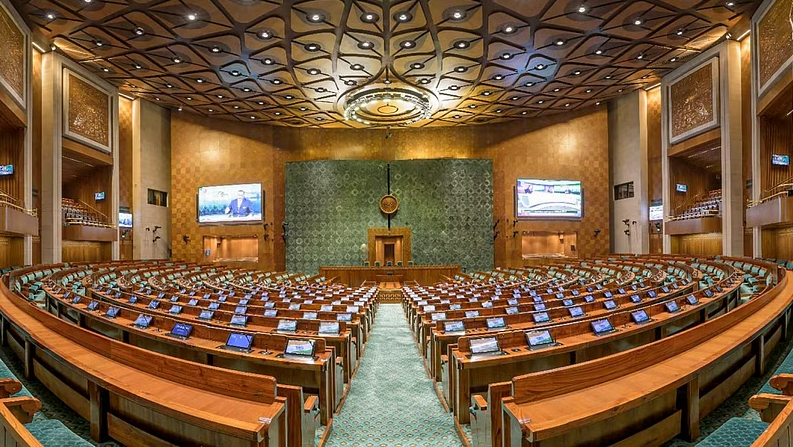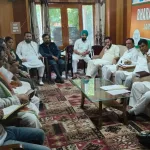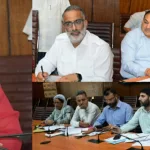The parliamentary session has become the focal point of intense political activity and escalating tensions, reflecting the deepening divisions within the political system. The atmosphere in both houses of Parliament is charged, with debates turning acrimonious and frequent disruptions marring the proceedings. The latest development, a no-confidence motion moved by the opposition against the Chairman of the Rajya Sabha, has further intensified the situation. This motion, while an accepted parliamentary practice, symbolizes the growing discord between the ruling party and the opposition, bringing into question the very functioning of one of India’s most important democratic institutions.
Parliament, as the cornerstone of democracy, is expected to function as a platform where lawmakers deliberate on policies and address the issues of the nation. However, in recent times, the institution seems to be grappling with a crisis of credibility and effectiveness. The session so far has seen little legislative work, with the agenda repeatedly derailed by protests, walkouts, and confrontations. The lack of consensus and cooperation among the political representatives has led to a logjam, with critical bills pending discussion and national concerns left unaddressed.
The no-confidence motion against the Chairman of the Rajya Sabha is a significant and rare move, one that underscores the opposition’s dissatisfaction with how the House has been conducted. The opposition has accused the Chairman of bias and partiality, alleging that he has failed to uphold the principles of fairness and neutrality in managing parliamentary proceedings. They claim that the rights of the opposition have been curtailed and that their voices are being stifled. For them, this motion is not just a procedural exercise but a symbolic protest against what they perceive as an erosion of democratic values within the parliamentary framework.
On the other hand, the ruling party sees this move as an unwarranted attack on the Chairman’s integrity and an attempt by the opposition to derail the functioning of Parliament. They argue that the opposition’s tactics are driven more by political opportunism than by genuine grievances. The government has also expressed frustration over the repeated disruptions in both houses, which it claims are orchestrated by the opposition to prevent meaningful legislative work. This blame game has deepened the divide between the two sides, making constructive dialogue increasingly difficult.
The no-confidence motion, regardless of its outcome, reflects a troubling trend in Indian politics. It points to the growing mistrust and hostility between the ruling and opposition parties, which is undermining the ability of Parliament to function effectively. The Chairman, as the presiding officer of the Rajya Sabha, is expected to rise above political considerations and ensure a level playing field for all members. However, the opposition’s challenge to his authority suggests a perception that this expectation has not been met. Whether this perception is valid or not, the implications of such a motion are significant, as it highlights the deepening institutional challenges facing Indian democracy.
The failure of Parliament to function effectively has left the public increasingly disillusioned. Citizens who look to their representatives to address pressing issues such as economic challenges, unemployment, inflation, and national security concerns are left disappointed as the focus shifts to political theatrics rather than problem-solving. Instead of substantive debates and discussions, Parliament has become a stage for confrontation and disruption, eroding its sanctity and purpose. The public’s frustration is further compounded by the fact that their elected representatives seem more interested in scoring political points than in serving the nation’s interests.
In recent years, there has been a noticeable decline in the quality of parliamentary debates. Personal attacks, partisan rhetoric, and procedural disruptions have replaced meaningful discussions on policy and governance. The media, too, has played a role in sensationalizing these conflicts, often highlighting the drama rather than the substance of parliamentary proceedings. This has created a perception among the public that Parliament is no longer a place where their concerns are addressed but a battleground for political rivalries.
The current situation calls for serious introspection by all stakeholders. The ruling party and the opposition must recognize their shared responsibility in ensuring the smooth functioning of Parliament. The government, as the majority party, has a greater responsibility to foster dialogue and cooperation. It must provide adequate opportunities for the opposition to express its views and engage in constructive criticism. At the same time, the opposition must adopt a more balanced approach, focusing on constructive engagement rather than obstruction. While protests and dissent are integral to a healthy democracy, they must not come at the cost of legislative productivity.
The role of the presiding officers, including the Chairman of the Rajya Sabha, is also crucial in restoring the dignity and effectiveness of Parliament. As custodians of the House, they must strive to maintain impartiality and fairness, ensuring that all members, regardless of their political affiliations, are treated with respect. They must also work to mediate between the government and the opposition, fostering an environment of dialogue and cooperation.
The public’s trust in democratic institutions depends on the ability of these institutions to function effectively and address the issues that matter to the people. When Parliament fails to perform its role, it not only weakens the democratic fabric but also undermines the faith of citizens in the political system. The current parliamentary session, marked by disruptions and discord, is a wake-up call for India’s political class. It is a reminder that democracy is not just about winning elections but about serving the people and upholding the principles of accountability and governance.
The challenges facing Parliament are not insurmountable. With a willingness to engage in dialogue, mutual respect, and a commitment to the nation’s welfare, the ruling party and the opposition can work together to restore the functionality and dignity of Parliament. By doing so, they can reaffirm their commitment to democracy and address the pressing issues facing the country. It is only through such collective efforts that Parliament can regain its status as the true temple of democracy and a reflection of the aspirations and will of the people.
(Author is a columnist and can be reached at: [email protected])








